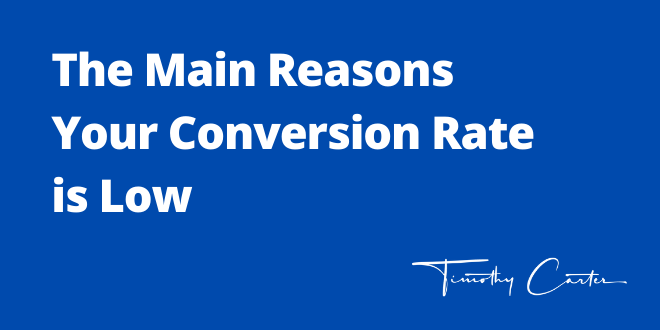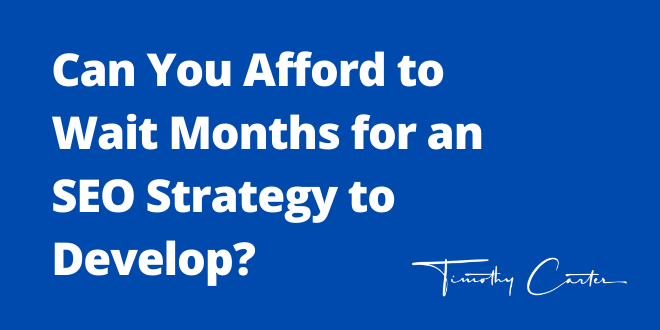
How to Make Your Content Marketing Strategy Worth the Investment
June 22, 2023
The Main Reasons Your Conversion Rate is Low
June 28, 2023One of the biggest concerns I hear from people considering launching a search engine optimization (SEO) strategy is the length of time it takes to see results. Depending on when you start, the competitiveness of your industry, how much you invest, and a handful of other variables, it will likely take weeks, or even months before you start to climb rankings and earn more organic traffic to your site. Sometimes, it can even take years.
Can You Afford to Wait Months for an SEO Strategy to Develop?
So if your company is eager to grow or if you’re struggling to turn a profit the way things are now, can you really afford to wait months for that strategy to develop?

Why SEO Takes So Long
Before we can understand the costs and benefits of waiting for an SEO strategy to develop, we need to understand why SEO takes so long in the first place.
SEO increases your rankings in search, but that takes time.
In case you aren’t familiar, SEO is all about increasing your rankings in search engine results pages (SERPs) for terms related to your brand and business. Over time, you’ll optimize your website for specific keywords, write excellent content, earn a better reputation, and eventually build the domain-level “authority” necessary to rank higher.
This is a time-intensive process for a few major reasons:
- It takes a lot to move the authority needle. If a total stranger gave you a single piece of advice that happened to work out, would you trust everything they say from then on? Probably not. But if you got 10 or 15 good pieces of advice from them, with no pieces of bad advice, you might feel a strong sense of trust in their judgment. When Google evaluates websites, it goes through a similar sequence of considerations. A single good article isn’t enough to prove that you’re an authority on a subject (in most cases); instead, it takes months of consistently good pieces to establish yourself as a reputable source.
- Going too quickly can hurt you. Let’s imagine it takes 50 good articles to start seeing SEO momentum (though keep in mind, there are more than 200 ranking factors, extending beyond your content). Why not just pump out 50 articles in week 1 and call it a day? While there aren’t explicit penalties for publishing too much content on your own site, Google is wary of spam and rank manipulators. If you try to push for too much, too fast, it’s only going to work against you.
- Competition exists. Also, competition in your industry is probably already thriving. If you’re entering an existing industry (and not creating a new one from scratch), there are likely dozens, if not hundreds, of competitors who have spent months to years climbing the SERPs. You’ll need to do even more work than they did if you want a chance to dethrone them.
ROI and the Timing Conundrum
As an aspiring search optimizer, it can feel intimidating to recognize how long it takes to see results – and how there are no real shortcuts. So is it even worth it to pursue SEO?
The short answer is yes, at least for most brands, because of the remarkable return on investment (ROI) that becomes possible after a long enough period of investment. Most of the assets you acquire and changes you make for SEO will be permanent; for example, the backlinks you build will remain up indefinitely, and each piece of content you create can remain relevant so long as you update it periodically.
Because you’ll be accumulating these permanent assets, your benefits can compound over time. Plus, as you jump in rankings in SERPs, your organic traffic stands to skyrocket; the vast majority of search engine traffic comes from the top 3 rankings of a SERP, so going from rank 6 to rank 3 is huge, and going from rank 3 to rank 1 is even bigger.
Together, these effects result in a strategy that outpaces almost every other marketing strategy regarding ROI.
Compensating for the Slow Ramp Up
Unfortunately, that alluring ROI doesn’t make the “slow start” problem go away. If your business is in desperate need of customers now or if you don’t have the consistent revenue to justify ongoing investment in SEO, there are a few ways you can compensate for the ramp-up, including:
- PPC ads. Pay per click (PPC) ads have the capacity to generate traffic instantly, since you’ll only pay for people who click those ads and get to your site. It’s also a slick way of getting people from search engines to your site – and good practice for creating and perfecting landing pages.
- In-house and periodic SEO work. You don’t need to hire a seasoned SEO veteran or work with a formal SEO agency – at least, not right away. You can learn the basics yourself and start doing some of the ground-level work on your own, in your free time, to build momentum.
- User-submitted content and collaborations. You can also collect user-submitted content and collaborate with other contributors to start developing content for SEO – without putting too much of a burden on your schedule or budget.
Conclusion
SEO isn’t a perfect strategy, but it’s incredibly beneficial if understood and used properly. Even its slow-going early momentum can be easily compensated for with the right approach – and in just a few months, you could be capitalizing on a sizable stream of organic traffic generated by your efforts.
Image Credit: pixabay; pexels; thank you!





